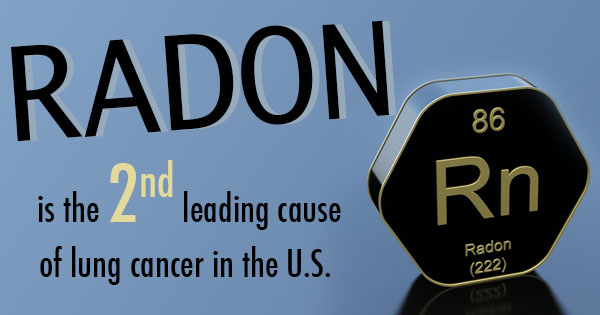 Radon is a silent killer. It’s an invisible, tasteless, and odorless gas. In fact, you could be breathing it in right now. That’s not a scare tactic, just the cold, hard truth. Radon is present in nearly all air, though its air concentration is usually low.
Radon is a silent killer. It’s an invisible, tasteless, and odorless gas. In fact, you could be breathing it in right now. That’s not a scare tactic, just the cold, hard truth. Radon is present in nearly all air, though its air concentration is usually low.
What makes radon so dangerous? It’s a radioactive byproduct. When the elements uranium, thorium, and radium decay, radon gas is formed. These elements are naturally present in rocks and soil, which is why radon is almost always present in the air. Radon can also be found in surface water.
While spending time outside likely won’t hurt you, for those who work in underground mines or other places without sufficient ventilation, radon exposure can cause lung cancer.
In fact, radon is the second leading cause of lung cancer in the U.S., behind cigarettes. The EPA and the Surgeon General’s Office estimate that radon causes 20,000 lung cancer-related deaths every year. The radioactive particles in radon damage the cells that line the inside of the lungs. Consistent damage from long-term exposure can lead to lung cancer. There is also evidence that supports the idea that radon exposure can also cause leukemia in both adults and children.
But it’s not just miners and cave-dwellers who should be worried about radon poisoning. It is recommended that all homes undergo residential radon testing and inspection before they are put on the market. Radon gas testing can help realtors or potential homeowners catch any radon hazards before they take their toll.
Radon mitigation and abatement services can also give you peace of mind and ensure that the radon levels in your home will not be harmful to you or your family. Radon mitigation systems can also be installed in order to regulate the gas levels. This is especially useful for homes that are located in radon-rich zones. In Colorado, many counties have significantly higher radon levels than those of the rest of the country.
If you want to find out more information about your state’s radon zones, visit EPA.gov. For radon mitigation and abatement services in Colorado, contact Affordable Radon. Our radon mitigation and abatement services are low-cost and effective against the toxic levels of radon that can cause cancer. The systems we install to regulate your home’s radon levels are aesthetically pleasing and will not disrupt the appearance of your home.

Recent Comments